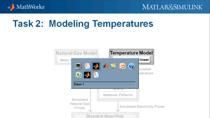Simulate Renewable Energy Systems from Months to Microseconds
Overview
In this webinar, we will show how Simscape can be used to develop renewable energy systems and how we can map computational tools to different stages of a technology development cycle. Through examples of a Type 4 wind turbine and a photovoltaic (PV) power system, we will show how to:
- Characterize renewable energy systems using look-up tables.
- Run quasi-steady simulations over months of system operation to gain insight on longer term energy production.
- Use ideal power converters to gain insight on functional response over a broad operational envelope.
- Use power converters with full switching to assess the impact of harmonics on system operation.
- Integrate different components into a system and develop management systems to achieve an overall operational objective.
- Design maximum power point tracking (MPPT) control systems for the wind turbine and PV system.
- Prepare a model for real-time simulation and/or deployment as a digital twin.
About the Presenters
Graham Dudgeon is Consultant Product Manager for Electrical Technology at MathWorks. Over the last two decades Graham has supported several industries in the Electrical Technology area, including Aerospace, Marine, Automotive, Industrial Automation, Medical Devices and Power & Utilities. Graham’s technical experience covers - Transmission & Distribution, Grid Integration, Renewable Energy, Power Conversion, Motors & Drives, Microgrids, Electric Aircraft, Electric Ship and Electric Vehicle, with an emphasis on system modeling and simulation, control design, real-time simulation, machine learning and data analytics. Prior to joining MathWorks, Graham was Senior Research Fellow at the Rolls-Royce University Technology Centre in Electrical Power Systems at the University of Strathclyde in Scotland, UK.
Nils Hornik is Senior Application Engineer for Electrical Technology at MathWorks. Nils technical experience covers a broad range of application areas including techno-economic optimization, power systems and power electronics simulation, renewable grid integration, decentralized power systems and algorithm development. Nils gained an MSc in Electrical and Computer Engineering from the Technical University of Munich.
Recorded: 22 Aug 2023



